Friday morning, I had the fortunate opportunity to speak with demographic trend expert and economic researcher Harry S. Dent. It was a great conversation and we covered a lot of topics, including the demographic outlook in America, the inflation/deflation argument, potential inflection points for the stock market based on spending wave turning points, and more.
I had intended to record and post the conversation, which was very lively (Harry gives a great interview) - but unfortunately I botched the recording! When I went to play it back afterwards - nothing at all. Agh!
But, we can't let that keep us down. It'd have been easier for me to post an mp3, but hey, my loss is your gain! I took copious notes, and I've been following Dent's research for a bit now, so here's a very detailed summary of our interview, and some topical background info in case you're new to his brand of demographic analysis.
Harry Dent's Previous Successful Bull Market and Depression Predictions
Beginning in the late 1980's, Dent began touting a bull market in US stocks that would go higher and farther than most believed. He reiterated that call in 1992 - a time when many analysts were very bearish (hard to believe in hindsight, but true - many bestselling investing book titles from the early 90's were doom and gloom).
Impressively, he stayed bullish during the early to mid 00's - again a time when many (including me) thought the stock market bubble had burst once and for all. Dent's analysis told him that there was one big last gasp for the party, thanks to boomer spending hitting its peak. (Note: He did have some very high price targets on the DOW that were not hit - some folks are a bit down on him for this, but I think that's missing the point of his research. Longer term index price predictions are very difficult. I'm more concerned with accurately predicting the direction of the trend - and he's been quite spot-on in this regard).
Dent's longer term warning alongside these bullish predictions, though, has always been that another Great Depression would follow the boom of the 90's and 00's, sometime from 2007-09. Now, right on schedule, we're on the other side of the boom/bust peak - and into our current Depression.
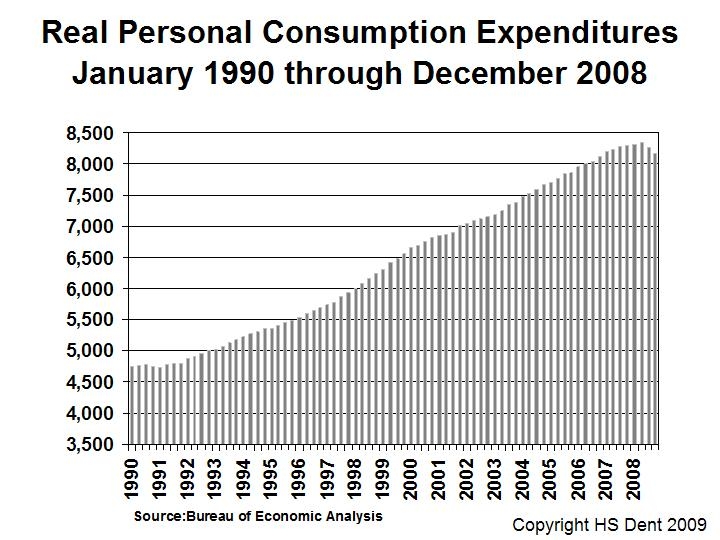
Source: HS Dent Foundation
As you can see from the chart above, consumer spending peaked in 2008, and is heading downward. According to Dent's research, this trend should be in play for some time. Why? Glad you asked...
How Demographics Drive Spending Trends (and Hence Stock Prices)
Dent's research shows that human spending habits follow very predictable patterns throughout the human lifecycle. Individuals typically hit their peak spending between the ages of 46 to 50, as depicted in the graph here:
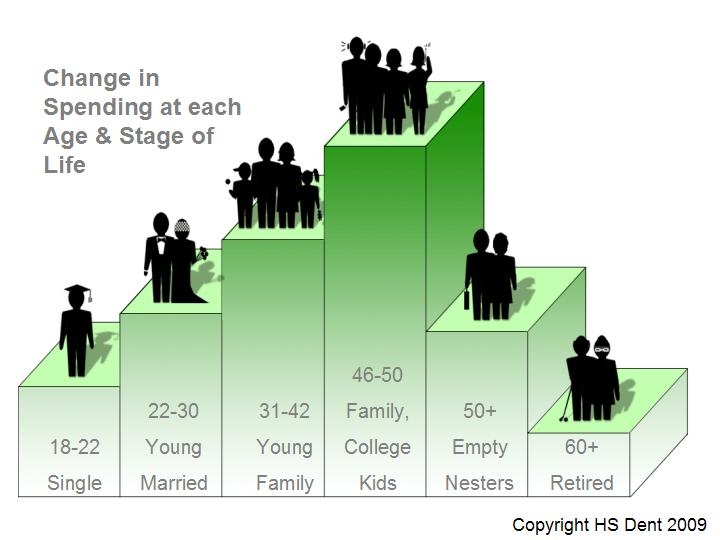
Source: HS Dent Foundation
These spending waves drive the economy, as well as stock prices. In the US, as you can see, there's been a very tight correlation between family spending, and stock prices:
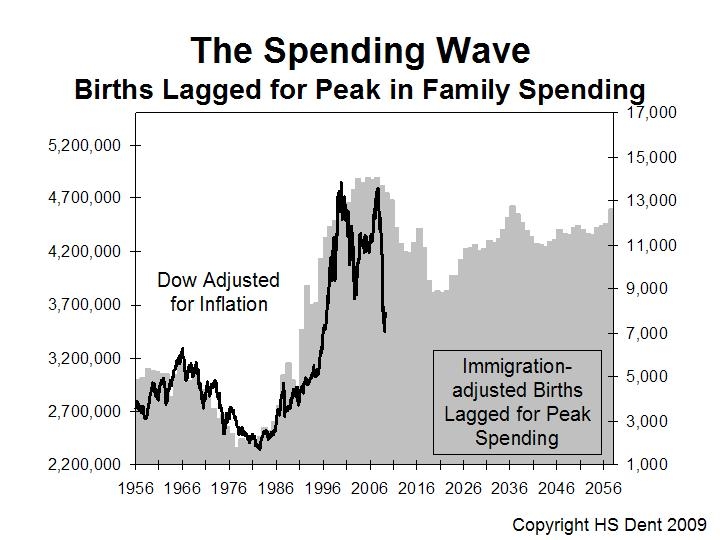
Source: HS Dent Foundation
Peak spending rolled over for the first time in 2007 - and the stock market rolled with it. If the economy continues to follow the spending wave, we're in for another lean 12 years, as the next peak spending pickup is not scheduled until 2022! This is due to the fact that baby boomers are now past peak spending - and we've got over a decade until the next "baby boomlet" hits peak spending stride.
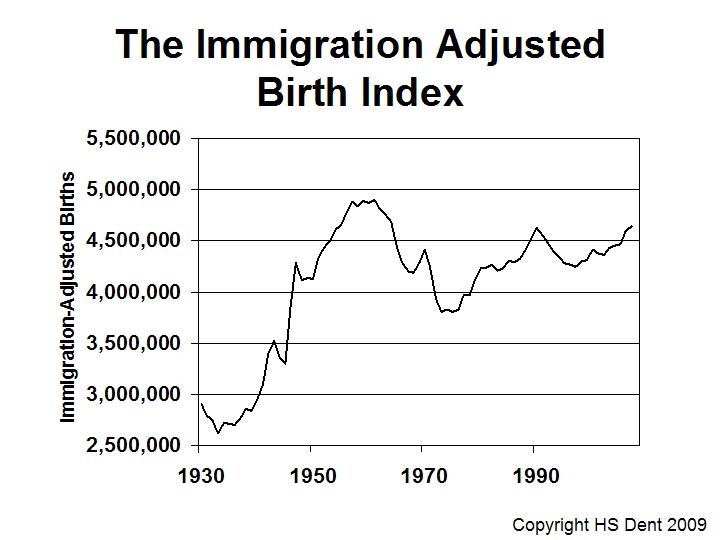
While everyone was busy getting high in the 60's and 70's...we actually could have used a few more babies!
Source: HS Dent Foundation
Why Government Stimulus Spending Isn't Working This Time
For the first time in American history, government stimulus is falling flat on its face. It's starting to become apparent that the record stimulus being thrown at our economy is not going to pull us out of this recession/depression. Why?
Because according to Dent's research, for the first time ever, we don't have favorable demographic winds at our back. During previous recessions, the government could float easy money out into the economy, and eager consumers would grab it and spend it - because they were in the upswings in their spending patterns. But this time, Bernanke & Co are merely pushing on a proverbial string. The Fed can extend credit - but they can't force the consumer to take it!
They can't get the baby boomers to take on more debt because of where they are in the spending cycle. It's a time to save, not spend, in their lives. Want a mortgage at record low rates? No thanks - we're already choking on debt! And we hope to retire someday.
Hence, the Keynsian solution that "worked" (quotes for you Austrian econ fans) so well during the 20th century is shooting blanks here in our 2008-2010 and counting Depression. Hmmmm, this is starting to sounds like another advanced economy that's been stuck in the mud for a couple of decades now...
Japan's Spending Wave Peaked in Tandem With Its Bubble
Dent's team accurately forecasted the current soft depression in Japan in the late 1980s, at a time when the world was wildly bullish on Japan's future. The secret was, again, the spending wave - Japan's baby boom reached peak spending in 1990, at it's been downhill ever since for Japanese stocks and real estate.
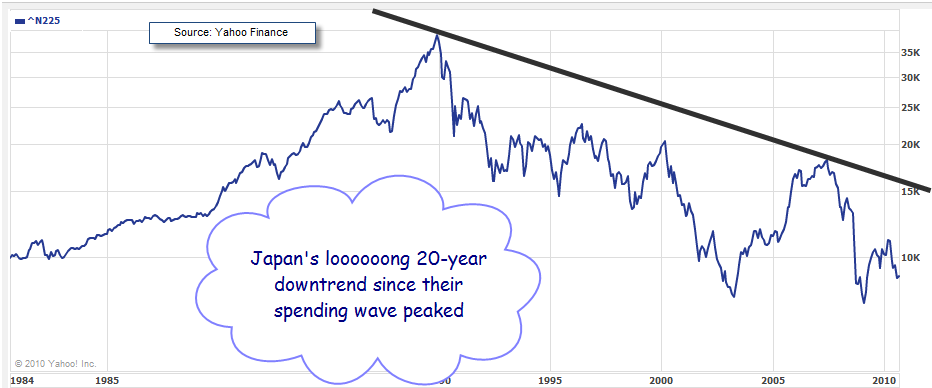
Since 1990, the Japanese economy has been fueled by government stimulus, and only government stimulus. Like a drug addict, as soon as the high of government spending wears off, the economy again slumps into recession. The same appears to be happening here in the US, as our initial stimulus begins to wear off, and we don't have much to show for it - except for a lot more sovereign debt, of course.
So Will It Be Inflation or Deflation?
Dent cites the massive amount of private debt (estimated to be $50-100 trillion or higher) as a large pool of credit that is going to have a significant chunk written down (his debt deflation scenario is similar to Robert Prechter's in this regard, though less extreme).
As this massive amount of bad debt floats away to "money heaven", the forces of deflation will overwhelm any amount of potential government stimulus, Dent believes. Also, with the US citizenry already quite pissed that the last stimulus didn't do much of anything, the Federal government's hands may be increasingly tied by voters calling for austerity measures (or at least, more responsible government spending).
Return of the Bond Vigilantes?
I used to think that if there was reincarnation, I wanted to come back as the president or the pope or as a .400 baseball hitter. But now I would like to come back as the bond market. You can intimidate everybody.- James Carville, political advisor to President Clinton
Even if Joe Sixpack doesn't rise up, Dent anticipates a far more powerful force will ultimately check the government's ebullient spending - the bond market. During the last wave down, the bond market benefited as a "flight to safety play". Dent doesn't see that repeating next time - instead, he sees concerns over government debt as being a cue for the "bond vigilantes" to ride back onto American soil and enforce some level of fiscal sanity - likely when the next stimulus package is floated out there.
He cites the speed at which the vigilantes can mobilize and drive up the rates on government debt - like the quick spike in Greek interest rates this spring - as an example of how fast spreads can skyrocket.
Overall, his team projecting a potential 2% rise in 10-year yields - which would push the 10-year yield up from 2.5% to 4.5%. Think the housing market is in trouble now? Imagine a 2% bump in mortgage rates!
Deflation Investing Strategies
"Cash is king" is Dent's mantra today - specifically US dollars.
Why dollars? Because the supply of dollars is going to continue to contract as debt continues to contract - and it will contract at a much faster rate than the Fed can potentially create it.
The US Dollar is not going to crash - it's already crashed, says Dent. A 60% drop since 1985 is a huge move in the currency markets. Now, the deflationary period ahead will serve its purpose of restoring the value of the dollar, which is still the unchallenged world reserve currency.
He also likes bonds, but not yet. He thinks the time to buy will be if and when the bond vigilantes ride into town and bring yields up to 4.5% or so. That would be a compelling buy, that could yield 5-6% per year overall, when factoring in price appreciation. Dent forecasts that yields would then slump slowly for a long period of time - a la Japan.
Making Sense of Today's Schizophrenic Markets
While Dent's demographic forecasting models have been extremely accurate in forecasting long term economic trends, he readily admits that the immediate short term is often much more difficult to predict. And that's never been more true than it is now, as many experts are scrambling for a clue. This economic and investing environment is truly a once-in-a-lifetime event.
How to Manage Your Life During Deflation
In your personal life, Dent similarly believes that cash flow is king during this deflationary depression. If you run a business, he recommends you cut all unnecessary expenses, and work to maximize your cash flow and efficiency.
Thinking of buying a home? You may want to wait until at least 2012 or 2013, as mortgage rate resets are set to continue through 2011. Given a one-year lag on price declines, and we won't see a housing market bottom until 2012 in the earliest.
In the meantime, your cash will increase in value, possibly quite significantly (see Nikkei chart above!) and you'll be able to get much more house for your buck if you sit tight and wait (also see our Renter's Manifesto for an admittedly biased rent vs. buy rant).
Countries With the Most Favorable Demographics
Out of the world's major countries, Dent likes India's demographics the best. China does not compare as favorably - due to their baby nightmare "one child per family" policy. He thinks China will get old before it gets rich, and that per capita, their wealth will never reach that of the current US.
Looking at emerging markets, Dent loves the promise of Southeast Asia, and Vietnam in particular. He's also intrigued by the Middle East, and sees opportunity there, provided they are able to keep it together somewhat politically (a big IF, for sure!)
Investing abroad will be very important for Americans after the current crash is worked out, he believes, because the cherry days of investing in America are over. While sectors such as healthcare may perform well as the US wheels itself into the nursing home, history has shown that the most compelling investment opportunities are often found in countries that are roaring to up Dent's spending wave curve.
Summing It Up - Big Picture Forecast
Dent expects a major bottom in the stock market sometime around 2012. He thinks that the previous lows will likely be taken out, with the market falling significantly once again (DOW anywhere from 3800-6440). If that happens, you obviously don't want to be in stocks.
Between now and then, he's allowing for another potential rally that could set new highs in the market, and carry all the way into next year. That's not required, though, as he thinks it's possible the stock market rolls over sooner as people come to the realization that the economy is not actually improving.
Bottom line is that he sees very little upside to stocks at this juncture, and a lot of potential downside.
Following the epic 2012 bottom, Dent says we could see a bear market rally as long as 5 years, eventually giving way to another gentle slump that would take us up to the next spending wave uptick in 2022.
Dent, like David Rosenberg, believes that ultimately austerity measures will win-out in America. It will be a painful 10+ years, but this is what the "winter" season is for, as Dent refers to it - to clean out the excesses of bubbles past, and prepare for "spring", a new season of growth.
It's not the end of the world - you can come out of this financially fine, and even ahead of the curve, if you are smart about navigating these deflationary waters.
More From Harry Dent
I'd highly encourage you to visit www.hsdent.com for some great free resources from Harry Dent and his team. He also has a free newsletter available that breaks down the debt crisis. Please click through to www.hsdent.com to check out his latest stuff (and to thank him for giving us the interview!)
You can also pick up a copy of his latest book, The Great Depression Ahead, online or at your local bookstore.





